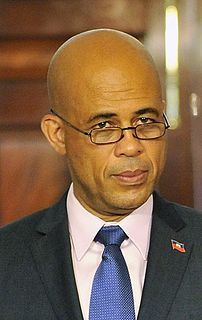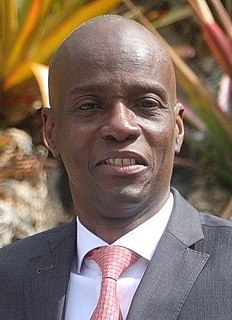A Quote by Roxane Gay
When I was a child, my parents took my brothers and me to Port-au-Prince during the summer so we could get to know the country of our ancestors. Because Haiti is an island, the beach is everywhere. Haitians are particular, even snobby, about beaches.
Related Quotes
You think about the Bahamas, you think it's this island full of beaches and chilling on the beach, but there's a lot of freak athletes down there that can play, and a lot of guys better than me who I feel like didn't get an opportunity like me, but when I got my opportunity, I took full advantage of it.
I actually happened to be in Haiti right before the earthquake in 2010. I was there already with the organization I work with now, Artists for Peace and Justice, visiting the primary school that I had adopted, the Academy for Peace and Justice in Port-au-Prince. I came back, and within days, the earthquake happened.
Haiti is the kind of place that grabs your heart, and never lets go ... When you arrive in Port-au-Prince, the first thing that strikes you is how vibrant the colors are. Buses, buildings, fences, clothing, everything is brightly painted in primary hues. On closer inspection, you see the reality behind this brightly colored landscape: a dark, grinding poverty, the worst in the Western hemisphere.
I never considered myself as somebody in exile because, different to my father who, yes, was in exile because he left Haiti as an adult, for me it was just to be somewhere else. I carried Haiti with me everywhere, but I also carried, you know, my youth in a public school in Brooklyn. It's part of who I am as well.
Here's the story: 25 years ago, I had my lips injected with silicone. Stupid thing to do at 24. I saw 'Beaches.' Remember that movie 'Beaches'? I did it with my best girlfriend, so she and I go and we get our lips done. Fine. I have it like that for my whole career, right? So then cut to a couple of years ago, I have a doctor remove as much as they possibly can because it got to the point where they were yucky. You know, they get hard. It's gross. They are now whatever that was after they took out as much of the silicone as they could.
It seemed from the media that we were being told that all Haitians had AIDS. At the time, I had just come from Haiti. I was twelve years old, and the building I was living in had primarily Haitians. A lot of people got fired from their jobs. At school, sometimes in gym class, we'd be separated because teachers were worried about what would happen if we bled. So there was really this intense discrimination.
I guess, for me, I've always thought that there was humor everywhere. And as a kid, I just, you know, I grew up an only child, and I - sort of nothing made me happier than to make my parents laugh. I remember I had costumes and things laying around the house that I was, you know, anything that I could do to make my parents laugh.





































